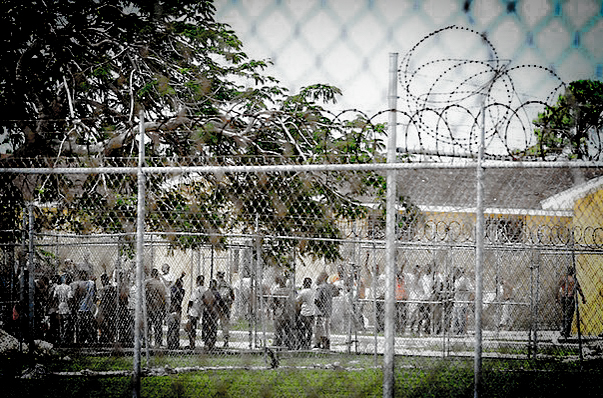






Bahamas arbitrarily intercepts and detains immigrants from Cuba, Haiti and other nations for undefined periods of time at the Carmichael Road Detention Center, a prison in Nassau.
For the detained, the government denies the possibility of asking for refugee status and sends them back to their country of origin, although there may be good reasons for them to think that their life, security and liberty could be in danger.
CEJIL carried out a mission of documenting the detention center in July 1998 to understand the situation of those seeking political asylum. At the moment of the visit, there were approximately 300 people detained. Of this group, 120 were Cuban, 100 were Haitian and the remaining 80 people were of other nationalities. Many of the victims had a legitimate right to demand refugee status in the Bahamas, but could not do it because the government didn’t include the procedures so that a person could solicit and receive political asylum. Nor did those detained have the possibility of asking for their freedom while they waited to be recognized as refugees.
The 38 Cubans with whom CEJIL could speak with, mentioned their opposition to the Cuban government as their reason for escaping their country. They had fundamental reasons for requesting refugee status, since they feared torture and assassination if they returned to Cuba. Many of the interviewed victims were shoved together with relatives, even with small children. The eight Haitians that were allowed to be interviewed mentioned the lack of governmental protection as the reason for leaving their country.
Before the CEJIL mission, the Bahamas had deported more than 100 Cuban citizens, despite the fact that Nicaragua has offered to take in the refugees.
The impossibility of asking for refugee status, the arbitrary detention, and the treatment given to the prisoners implicate violations of the American Human Rights Declaration and the Convention over the Status of Refugees and Protocol.
On August 13, 1998, CEJIL and the Open Society Institute brought the case before the Inter-American Commission on Human Rights (IACHR) and asked that precautionary measures be taken to prevent the deportation of the victims to their countries of origin. The following day, the commission approved the measures to avoid irreparable damage to the victims; however, the Bahamas continued to deport Cubans.
The government has alleged that there is a legitimate worry that large numbers of immigrants use their territory as a door to enter the United States and admitted that it didn’t have any legislation that regulated the process to take in refugees, although it explained there were administrative procedures.
The commission accepted the case in 2002, with a base in the American Declaration of the Rights and Duties of Man and the Charter of the Organization of American States, of which the Bahamas is a member.
Help us continue this critical and urgent work with a donation!
DONATE NOW